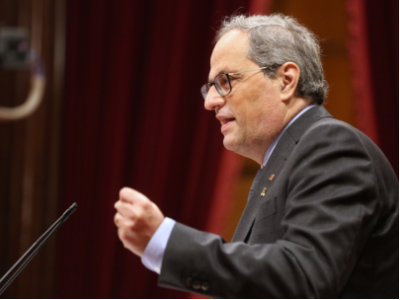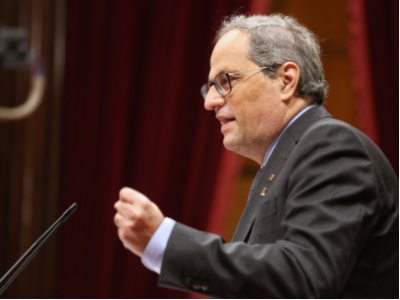- In the first session of the General Policy Debate, held in Parliament this morning, the president took stock of actions carried out by his government during the current legislature
- Torra stressed that the fight against Covid-19 is the government’s top priority
- The president called for collaboration to undertake structural reforms in the health system based on an expert report to be presented at the Palau de la Generalitat on Monday
- He urged parliamentary groups to support efforts to declare culture an essential good and highlighted work done to prepare for the start of the school year

Catalan President Quim Torra said this morning that he is committed to serving Catalonia “no matter the cost, to the last minute of my presidency”, stressing that he remains focused on fighting the pandemic and its economic and social consequences. He contrasted his commitment with the attitude of a state “set on revenge” that wants to bar him from public office “for having defended freedom of expression”.
The head of the executive said that despite “relentless repression” and “interference” in Catalonia’s political life, the government would continue “working to build a country of culture and talent for everyone”.
The president made these remarks as he took stock of actions carried out by the government during the first session of the General Policy Debate, held in Parliament this morning. Torra said the legislature had been marked by a firm commitment to strengthening Catalonia as a nation and by what he described as a “perfect circle of repression”, noting that the legislature began with “the government of Mariano Rajoy preventing a president of the Government of Catalonia from taking office, and now, under the government of Prime Minister Sánchez and Vice-President Iglesias, they want to remove another president”. (Tomorrow, the president will appear at a Supreme Court hearing on his appeal against a sentence for disobedience, handed down by the High Court of Justice of Catalonia after he defied an order to remove a banner in support of political prisoners and exiles from the façade of the Catalan government headquarters.)
In his speech in Parliament, President Torra reviewed some of the actions taken by his government during the current legislature, particularly those related to combating the Covid-19 pandemic. “The government has sprung into action in an unprecedented way to respond to all of the needs and emergencies that have arisen,” he said.
The president noted that the level of legislative activity has been much higher than in the previous legislature and highlighted the achievement of overcoming numerous obstacles to pass a budget for 2020.
A vibrant country
The head of the executive stressed the importance of a territorial revitalisation strategy launched under the banner País d’Oportunitats, País Viu [“Country of Opportunities, Vibrant Country”], which aims to combat depopulation in some areas of Catalonia and the impacts of an ageing population and generate opportunities and economic activity by “building a strong and stable relationship with local authorities, taking into account the specific characteristics of each territory”.
A specific measure to increase opportunities throughout Catalonia cited by the president was the accelerated deployment of fibre-optic cable to all municipalities with a population over 50. He said the work is expected to be completed in 2021 and that “90% of Catalonia’s population will be covered by the public fibre-optic cable of the Government of Catalonia”.
Catalonia’s economic recovery
Much of today’s session focused on initiatives aimed at generating economic activity and creating jobs. The president noted that, among other measures, the Economic Activity Facilitation Law has been passed to streamline relations between companies and government agencies. Torra said the new law has benefited 564,000 companies and 362,000 self-employed workers. The president also expressed the Executive Council’s concern over threats to industrial activity in Catalonia. He said the government has “worked tirelessly” to prevent the closure of Nissan facilities in Catalonia but was also concerned over news about the plans of other companies, such as Sant Gobain and Bosch. He stressed that his ministers were doing everything possible to “maintain and/or reorient the activity of these companies in order to save jobs”.
The head of the executive emphasised the importance of the Catalan Agreement on the Knowledge Society as a tool for making Catalonia a hub for knowledge, training, innovation and leadership in technological change, which would in turn strengthen the economic fabric. In the first phase of the plan (up to 2024), overall expenditure on RDI is expected to reach 2.12% of Catalan GDP. He also mentioned the launch of the Cybersecurity Agency of Catalonia and the fact that the Executive Council has secured a commitment from the Mobile World Congress to continue holding the event in Barcelona until 2024.
The president also highlighted the importance of steps to accelerate the digital transformation of schools under the Government Plan for Digital Education 2020–25, which aims to ensure equal opportunities and reduce the digital divide.
Delegations abroad
At another point in his speech, the president stressed the key role that Catalonia’s delegations abroad play in boosting exports and attracting investment. He said three new delegations had been opened, in Tunisia, Argentina and Mexico, and that work is under way to open another three in Australia and New Zealand, Japan and Senegal.
The fight against Covid-19
President Torra focused much of his speech on the fight against the coronavirus and efforts to tackle the health, educational, economic and social emergencies triggered by the pandemic. He stressed that this fight is the government’s top priority. With respect to the health emergency, he noted that the situation is not as serious as it was at the peak of the pandemic but called for “collective responsibility” to ensure that the situation does not worsen.
With respect to education, Torra talked about the school reopening plan and the action plan for the 2020–21 school year, which aims to maximise face-to-face learning. He said that the plan will be adapted as necessary as the health situation evolves. Finally, he once again stressed the need for the central government to regulate paid leave for parents who must stay home to care for quarantined children.
As for the economic and social emergency, the president lamented that government revenue has fallen as a result of the pandemic, and that so far the only extra financial resources have come through the Covid-19 Fund of the Spanish Ministry of Finance. The president said the central government has yet to distribute another €8bn among Spain’s regions and that this amount was “absolutely insufficient because Catalonia needs €5bn in direct transfers, and for the deficit ceiling to be raised to 1% of GDP (€2.2bn)”. Torra called for “collaboration” to ensure that Catalonia receives as much support as possible from European funds. “We need to reach a figure of €30bn and for that money to be administered by those closest to the situation on the ground, together with local authorities and economic actors.”
In this challenging situation, the head of the executive stressed the importance of “working together to reactivate Catalonia, protect the most vulnerable, and shore up a welfare state that it’s taken us generations to build”.
Health system reform and culture as an essential good
In the field of health, the president noted that a committee of experts had been formed to study ways of transforming the public health system and said their proposals would be presented at an event to be held at the government headquarters on Monday.
As for culture, Torra said the sector was one of the hardest-hit and emphasised the importance of “bailing out culture and putting it at the centre of people’s lives, because it’s an essential service”. He therefore asked for the support of the chamber to find mechanisms for declaring culture an “essential good”.


